|
Tachinidae or?
|
|
| cthirion |
Posted on 24-08-2004 13:50
|
|
Member Location: Posts: 901 Joined: 13.08.04 |
From Plisthenes (Photentomo) from Dalmatie!
cthirion |
|
|
|
| Zeegers |
Posted on 07-09-2004 17:08
|
|
Member Location: Posts: 18446 Joined: 21.07.04 |
Have you collected this fly ? It definitely looks like a Tachinid, but I am not familiar with these species. Although the picture is very good, it is not possible to see all the necessary features. So I can help you out if the specimen is available. It looks quite interesting ! Theo Zeegers |
|
|
|
| Gerard Pennards |
Posted on 08-09-2004 15:02
|
|
Member Location: Posts: 1914 Joined: 07.06.04 |
Hai everybody, Could it be a Phyllomya volvulus? Greetings Greetings, Gerard Pennards |
|
|
|
| Zeegers |
Posted on 09-09-2004 20:18
|
|
Member Location: Posts: 18446 Joined: 21.07.04 |
Hi Gerard, Sorry, but no, this is not Phyllomyia, because the topcel in the wing has an extraordinary long petiole. More common to Rhinophoridae than Tachinidae, but still my first guess is that this is a special Tachinid. Theo Zeegers |
|
|
|
| Kahis |
Posted on 11-11-2004 16:01
|
|
Member Location: Posts: 1999 Joined: 02.09.04 |
Zeegers wrote: More common to Rhinophoridae than Tachinidae, but still my first guess is that this is a special Tachinid. Theo Zeegers I know this is 'old news'... I did recently get some flies very much like this for identification. They did belong to the Rhinophorid genus Stevenia. But I am not very familiar with this small group of flies, so treat this identification with caution. |
|
|
|
| ChrisR |
Posted on 24-11-2004 17:48
|
|
Administrator Location: Posts: 7699 Joined: 12.07.04 |
I'd go along with the tentative ID of 'rhinophorid' as it reminds me of a rhinophorid i have caught here in the uk - the exceptionally long petiole and the faint shading on the wing membrane along the veins all suggest this. |
|
|
|
| Zeegers |
Posted on 25-11-2004 20:40
|
|
Member Location: Posts: 18446 Joined: 21.07.04 |
I have looked at it again and oke, it might very well be a Rhinophoridae, in which case it is likely to be Stevenia, as already suggested. Theo Zeegers |
|
|
|
| Jump to Forum: |


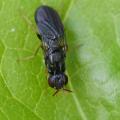



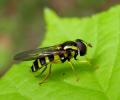
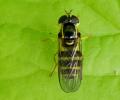

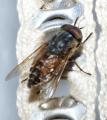
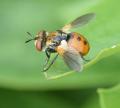



 but don't see the image in the post.
but don't see the image in the post.
